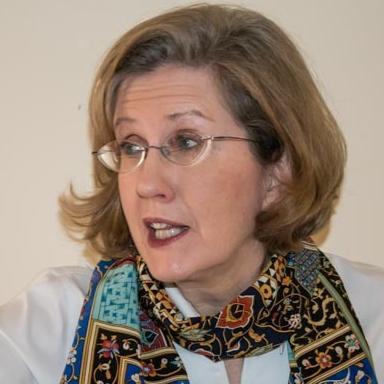
Margaret Wachenfeld
Professor Wachenfeld is an international lawyer and policy adviser with expertise and experience in applying and linking key international developments and standards related to human rights, human development, good governance, extractives, environment, and climate change to the work of international organizations and the private sector. As a senior research fellow at the Institute for Human Rights and Business (IHRB), Professor Wachenfeld is the focal point for IHRB’s work in East Africa and the research lead for IHRB’s work with the Myanmar Centre for Responsible Business. Professor Wachenfeld started her career as legal counsel to the Danish Institute for Human Rights. After practicing law in a commercial firm, focusing on environmental and corporate responsibility issues, she joined the International Finance Corporation (IFC) (World Bank Group) to work on environmental and social dimensions of project finance transactions and later served as the principal human rights advisor at the IFC. More recently, Professor Wachenfeld was senior policy advisor to UNICEF, covering a wide range of child rights issues. Professor Wachenfeld has a Bachelor of Arts (BA) in biology from Wellesley College, a juris doctor (JD) and masters in international and comparative law (LLM) from Duke University School of Law and a PhD in law (licentiat) from the University of Copenhagen.
CourSe
INTERNATIONAL HUMAN RIGHTS ADVOCACY: BUSINESS AND HUMAN RIGHTS (LAW-795B-E001) (Spring) Through this class we will explore one of the most rapidly growing area of human rights normative development and practice – business and human rights. This course focuses on the legal, practical and political challenges that all stakeholders face in this new area of emerging international law. The first segment of the course will explore the history of events and drivers leading up to development of the normative frameworks on business and human rights. It will then turn to a detailed examination of the two most important frameworks - the UN Guiding Principles and the OECD Guidelines on Multinational Enterprises - as well as the evolving draft treaty on human rights and business. we spend two classes on the “forgotten pillar” on access to remedy and will explore different avenues for accessing remedy, with some selective look at emerging jurisprudence on holding businesses accountable. The second segment will then shift to a more practically focused discussion on business and human rights through four lenses: (i) specific groups (indigenous peoples, women, children and temporary and migrant workers), (ii) selected sectors (finance and ICT); (iii) a selected topic (land) and (iv) a selected country (Myanmar). The course will end with brief look at the next big framework that has emerged on the business and human rights horizon – the Sustainable Development Goals. Some parts of the second segment deliberately focus on business and human rights issues in developed rather than developing economies for several reasons. Other parts of the second segment deliberately focus on key issues in developing countries to highlight common challenges that government, business and civil society face in those markets.
